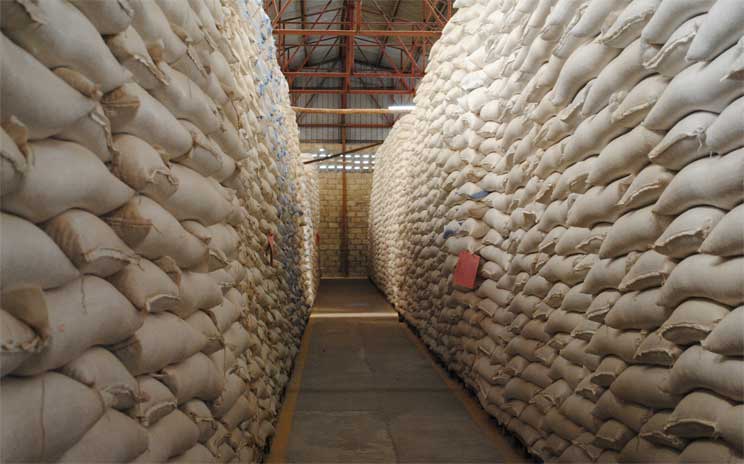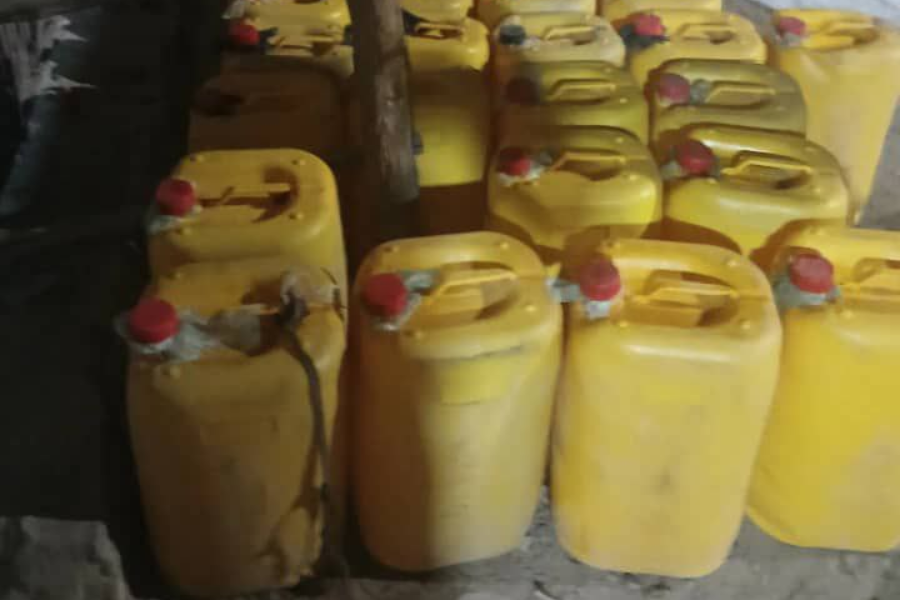
Radar | Jan 22,2022
At the end of last week, Abdi Addis, owner of an old, worn-out pickup truck, found himself stuck in the streets of Lancia when his car broke down after running out of fuel. He was filling his gas tank using a five-litre container purchased from across the street. Ironically, he was travelling from Bole to Lancia looking for gasoline when his car gave up on him.
To his delight, right across the street a National Oil Company (NOC) gas station, one of the 120 stations in the city, happened to be selling the benzene he was so desperate for. Alas, this gas station was destined to run out soon too.
Abdi earns his living through the transportation of goods. In addition to the shortage of gasoline currently gripping the capital, he is challenged by the enormous increase in the prices of petroleum products in recent months. Abdi says that he is unable to make up for the costs by charging more for his services as customers will not allow it.
"They [customers] don't understand when you tell them the price of fuel has increased," he complained.
Abdi is one of many whose daily lives have been compromised by the shortages in fuel supply, as well as the swelling price.
That same afternoon, the NOC gas station located at Temenja Yaz railway terminal was serving customers waiting in long queues. Soon it too ran out of benzene and was forced to put up a sign reading "benzene unavailable" to the dread of waiting customers.
Andarge Gebeyehu, stock manager at the station, explains that disruptions in supply have been recurring since January and have reached their peak over the past couple of weeks. Two months ago, the station sold up to 6,000lt a day on average, but recently that figure has risen to 14,000lt.
Andarge explains that due to a surge in demand, their stock depletes quickly, and it takes longer than normal to receive a fresh supply. He added that diesel fuel is much less likely to run out. The manager suspects that the significant drop in demand for diesel could be explained by the restrictions placed on manufacturers and construction firms, the largest buyers, regarding the bulk purchasing of diesel.
The supply and pricing of petroleum has been a recurring national problem for a long time. The sector battles with the incessant depreciation of the Birr coupled with the shortage of foreign currency, the ever-increasing demand that comes with population growth and rising economic activity, illicit sales activities to neighbouring countries, and the illegal storage of petroleum.
Anteneh Addis, one of the station attendants at Total gas station in Lancia, explains they have been running out of stock in less than 24 hours as customers queue up more than ordinary.
The staff were offloading diesel stock while customers drove by asking for benzene. He stated that diesel is coming in frequently, but it takes a couple of days for the station to receive Benzene. The situation has worsened after the price increase, according to Anteneh.
However, a NOC station in the Bambis area was selling both benzene and diesel. Its supervisor, Sisay Ayalew, relayed that his station has not been exposed to the shortage facing so many others.
Total gas station in Lancia ran out of benzene last week but continued selling diesel.
"I order early, noticing how my stock is running out," he said.
The station has also not experienced delays in restocking, according to Sisay, but he does affirm that he has witnessed an increase in demand recently.
Long queues at gas stations across the city can be observed as early as 7:30am. "Our station is given high priority as it serves lots of customers," he said, explaining why the station has not been affected by the shortage.
The price of petroleum has been steadily rising for over a decade. In 2010, the yearly average cost of benzene was 12.02 Br a litre. Last fiscal year, the price of benzene held steady at 21.53 Br a litre, levelling off from the 14pc increase observed since 2017.
Based on the decision to do price revisions at the beginning of every month, major price adjustments were made for the first two months of 2021. In January, the price for a litre of benzene increased from 21.53 Br to 23.67 Br. Then in February, a nine percent increase pushed the price to 25.82 Br a litre.
The increase was necessary due to the spike in global petroleum prices, according to the Ministry of Trade & Industry. The new price adjustment only addresses 25pc of the increase as the government is covering the rest of the cost.
Price adjustments in petroleum usually send drivers scrambling. In the days leading up to the announcement, gas stations were blitzed by vehicles hoping to save some money before the prices went up.
But passengers are feeling the pressure too.
Earlier this week, the Addis Abeba City Transport Bureau announced a hike in costs for public transport. Sheger, Anbessa and subsidiary buses were not subject to the price increase as the Administration plans to contribute up to 1.5 billion Br in subsidies.
Ride Transport Technologies, the owner of Ride, a taxi-hailing app, has enacted a 20pc increase on its service charge of 50 Br, which had remained constant since the establishment of the service.
Data from the Association of Petroleum Dealers shows that there are about 800 gas stations in Ethiopia, 120 of which are located in the capital. Their storage capacities range from 25,000lt to 250,000lt.
One of the suppliers to these stations is Dalol Oil Share Company, which caters to the 22 gas stations under its brand located across the country. Bruck Girma, general manager of the company, says there has been a fuel shortage over the past few weeks. The time between January and March is ordinarily a peak demand season when a lot of sales happen, attributable to high summer business activities, according to him.
The Association of Petroleum Dealers, which was formed in the 1970s, has been receiving numerous complaint calls from gas station managers lately.
Ephrem Tesfaye, a board member at the Association, explains that a significant shortage of petroleum has been noticed in the capital in particular. A lack of benzene is becoming increasingly alarming in the city centre, while long queues for diesel are observed on the outskirts of the city.
The Association has made frequent attempts to hold discussions with the Ethiopian Petroleum Supply Enterprise (EPSE) but to no avail, according to the board.
"The government hushes everything up as they don't want to acknowledge there's a shortage," exclaimed Ephrem.
Regardless, Ephrem believes that the shortage can be attributed to two main problems. The recent fall in supply occurred because petroleum was not transported from Djibouti for three or four days before the price adjustment for the month of February was enacted, although this claim is strongly denied by the Enterprise. Three days of supply amounts to about nine million litres, according to data from the Ministry of Trade & Industry.
"Within these three days, most gas stations ran out of stock," Ephrem told Fortune. "This has created a deficit that might take a month or so to rectify."
However, a similar incident did not occur when the 10pc increase was implemented in January. Why it is happening now is a mystery to the Association, which reported that it has yet to receive any sort of explanation from the government.
The second cause, according to Ephrem, is the exponential growth of fuel demand in urban centres like Addis Abeba. The supply is unable to cope with the growing demand and the gap is worsened by the inefficiencies exhibited in supply management.
Data from the Association shows the demand for petroleum is growing at a 10pc rate a year.
The Association is also concerned that the shortage might get worse in the coming weeks once a change in the payment modality of fuel takes hold starting from March 10, 2021.
Next month a new modality of payment that stipulates that dealers purchase fuel from companies with upfront cash payments instead of the former credit system will begin to be enforced.
Dealers have voiced their distress saying that this method is untenable while profit margins remain low. Dealers are now making 80 cents in profit from one litre sold, amounting to about a one percent profit margin. The Association, in its press release held late last week, asked for an extension for the implementation of the new payment scheme in the hopes of averting yet another looming crisis.
Abayneh Awol, fuel supply manager at Petroleum Supply Enterprise, denies claims that problems are being triggered by shortages in petroleum supply. The Enterprise is supplying as much petroleum as it was before, according to him. The manager indicated that the disturbance might have its roots in distribution, which is beyond the mandate of the Enterprise.
Eshete Afaw, state minister for Trade & Industry, echoes complaints of a similar nature. The volume of imports has increased significantly from 1.5 million litres a day on average over the last fiscal year to 2.9 million litres a day imported so far this fiscal year.
Eshete also points his finger at gaps in distribution, citing that illicit sales are still prevalent in addition to customers' tendency to hoard in fear of price hikes. The Ministry is working closely with security personnel to closely monitor fuel dealers.
In addition, a task force has been put together to investigate the illegal distribution of fuel in the capital as well as in other regions of the country.
Serkalem Gebrekristos (PhD), an expert with two decades of experience in petroleum supply, suspects the shortage might be a side effect of the quota-based allocation system that the Petroleum Supply Enterprise has been implementing. Companies get an amount based on demand estimations made by the Enterprise. This system was implemented to prevent contraband sales.
The expert also believes that the low-profit margins in the industry contribute to furthering the illicit sales in neighbouring countries. As petroleum prices are very high in countries like Djibouti, dealers might be tempted by the higher profit margins.
Concerning demand, Serkalem stated that a 10pc to 15pc consumption increase is to be expected every year and that the government also attempts to increase supply volume based on these figures.
"We always treat symptoms instead of the root cause," he said.
Operators in the industry should sit down for discussions and solve the problems once and for all, Serkalem strongly suggested.
"A solution that involves professionals and goes beyond fire fighting is much needed," he added.
PUBLISHED ON
Feb 20,2021 [ VOL
21 , NO
1086]

Radar | Jan 22,2022

Radar | Nov 27,2018

Fortune News | Sep 21,2019

Radar | Nov 23,2019

Radar | Nov 21,2018

Radar | Aug 30,2025

Fortune News | Sep 06,2020

Featured | Sep 07,2025

Fortune News | Jul 19,2025

Radar | Jul 02,2022

Dec 22 , 2024 . By TIZITA SHEWAFERAW
Charged with transforming colossal state-owned enterprises into modern and competitiv...

Aug 18 , 2024 . By AKSAH ITALO
Although predictable Yonas Zerihun's job in the ride-hailing service is not immune to...

Jul 28 , 2024 . By TIZITA SHEWAFERAW
Unhabitual, perhaps too many, Samuel Gebreyohannes, 38, used to occasionally enjoy a couple of beers at breakfast. However, he recently swit...

Jul 13 , 2024 . By AKSAH ITALO
Investors who rely on tractors, trucks, and field vehicles for commuting, transporting commodities, and f...

Oct 25 , 2025
The regulatory machinery is on overdrive. In only two years, no fewer than 35 new pro...

Oct 18 , 2025
The political establishment, notably the ruling party and its top brass, has become p...

Oct 11 , 2025
Ladislas Farago, a roving Associated Press (AP) correspondent, arrived in Ethiopia in...

Oct 4 , 2025
Eyob Tekalegn (PhD) had been in the Governor's chair for only weeks when, on Septembe...